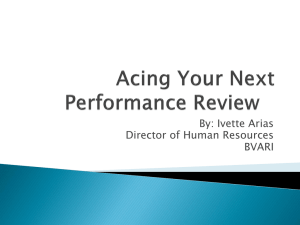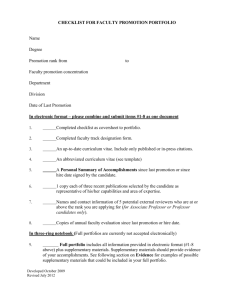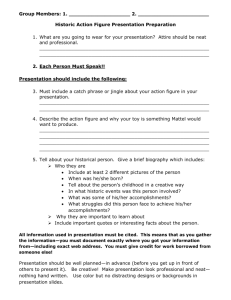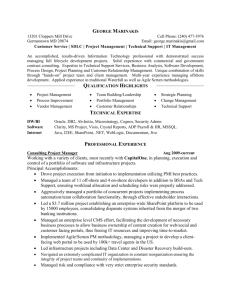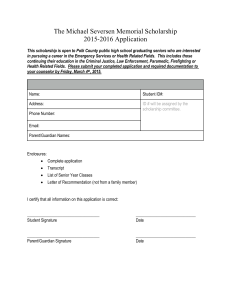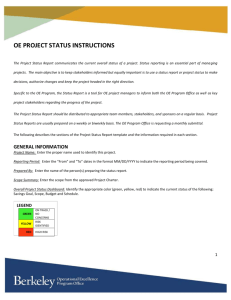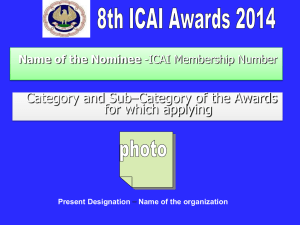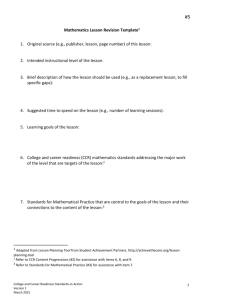College and Career Readiness - Office of Superintendent of Public
advertisement
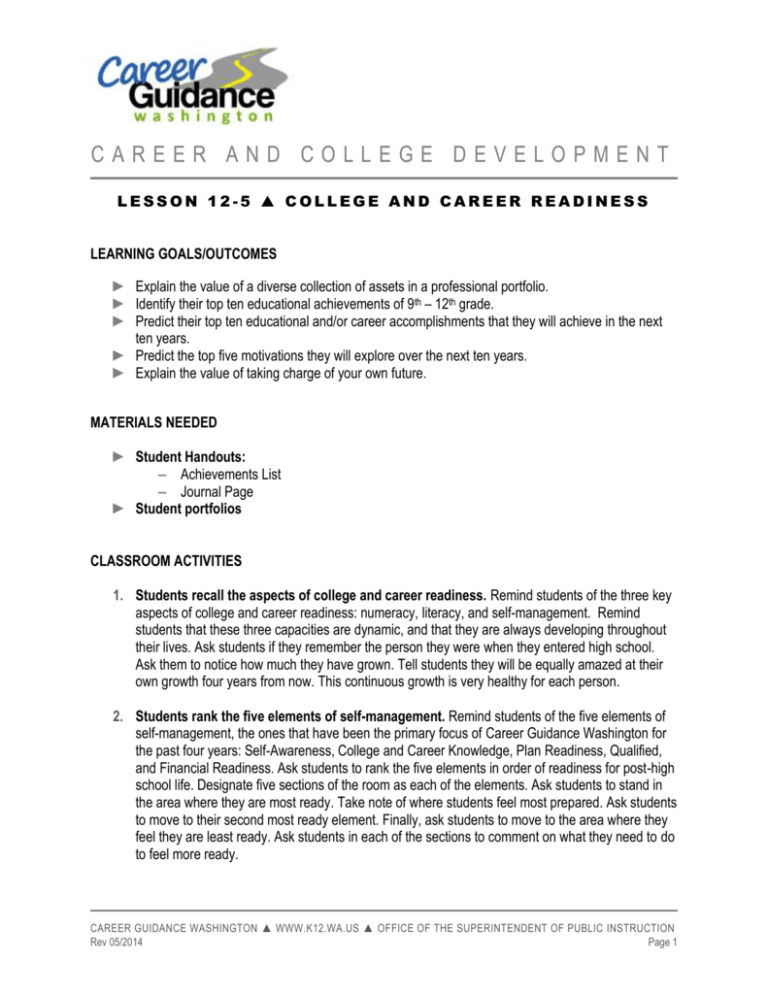
CAREER AND COLLEGE DEVELOPMENT LESSON 12-5 COLLEGE AND CAREER READINESS LEARNING GOALS/OUTCOMES ► Explain the value of a diverse collection of assets in a professional portfolio. ► Identify their top ten educational achievements of 9th – 12th grade. ► Predict their top ten educational and/or career accomplishments that they will achieve in the next ten years. ► Predict the top five motivations they will explore over the next ten years. ► Explain the value of taking charge of your own future. MATERIALS NEEDED ► Student Handouts: – Achievements List – Journal Page ► Student portfolios CLASSROOM ACTIVITIES 1. Students recall the aspects of college and career readiness. Remind students of the three key aspects of college and career readiness: numeracy, literacy, and self-management. Remind students that these three capacities are dynamic, and that they are always developing throughout their lives. Ask students if they remember the person they were when they entered high school. Ask them to notice how much they have grown. Tell students they will be equally amazed at their own growth four years from now. This continuous growth is very healthy for each person. 2. Students rank the five elements of self-management. Remind students of the five elements of self-management, the ones that have been the primary focus of Career Guidance Washington for the past four years: Self-Awareness, College and Career Knowledge, Plan Readiness, Qualified, and Financial Readiness. Ask students to rank the five elements in order of readiness for post-high school life. Designate five sections of the room as each of the elements. Ask students to stand in the area where they are most ready. Take note of where students feel most prepared. Ask students to move to their second most ready element. Finally, ask students to move to the area where they feel they are least ready. Ask students in each of the sections to comment on what they need to do to feel more ready. CAREER GUIDANCE WASHINGTON ▲ WWW.K12.WA.US ▲ OFFICE OF THE SUPERINTENDENT OF PUBLIC INSTRUCTION Rev 05/2014 Page 1 12-5 ▲ COLLEGE AND CAREER READINESS Tell students that this is their last Career Guidance Washington class. This is a good opportunity to look back over the past four years, and project forward to what will happen in the future. 3. Students explain the value of a diverse collection of assets in a professional portfolio. Tell students that it is projected they will work in at least ten different jobs in their lifetime. Assuming they work for 35 years, that’s less than four years per job! In each job, they will cumulate new skills, credentials, experiences, and networks that will support them as they move through their future jobs. Being a portfolio learner/worker has never been more important. Over the past four years, they have each been building a portfolio of assets that will help them gain access to future opportunities. Ask for volunteers to share ideas about the education, credentials, experiences, and networks they will need to achieve their present-day career goal. Ask if any students plan to continue filling their portfolio with information. Ask students to list the types of artifacts they might store in their future professional portfolio. Make a list on the board. 4. Students identify their top ten educational achievements of 9th-12th grade. Tell students that the last four years have had many accomplishments and disappointments. Today, they’ll be making a list of the high points. What did they learn? What did they accomplish? Ask for volunteers to share a few accomplishments from their high school years. Then distribute the Achievements List and ask each student to list their top ten accomplishments from high school. 5. Students predict their top ten educational and/or career accomplishments that they will achieve in the next ten years. Ask students to imagine they are attending their ten-year high school reunion. Everyone from their graduating class is there. Everyone is talking about what they have done over the past ten years. Ask students to project what their top ten accomplishments will be on that day. Ask them to consider work, education, recreation, leisure, volunteerism, and their family when they make their projections. Ask students to turn to the second page of the handout and imagine the top accomplishments they will achieve during the next ten years. Tell students these projections will be great to look at just prior to their actual ten year reunion! 6. Students predict the top five motivations they will explore over the next ten years. Ask students to review their top ten list of motivations in their portfolio (if hey don’t have them hand, simply have them list what values, ideas, or goals motivate the). What five of those motivations are most likely to be the focus of their life over the next ten years? Once students have filled those in on the third page of the handout, ask them to pair with one other student to compare motivations lists. Let students tell each other about what is in store for them. Have students repeat that pairing at least twice more with two different students. 7. Students explain the value of taking charge of their own future. Write the phrase, “Opportunity knocks,” on the board. Ask students to create a new pairing and discuss what that means. Also ask them to decide if they think that phrase is true. After some discussion, encourage students to understand that the phrase, “Opportunity knocks,” means that opportunity will present itself at your door at different times in your life. Encourage students to appreciate that, although that phrase will sometimes be true, more often it is true that opportunity waits. Opportunity exists for people who go find it, or create it. While one person waits for opportunity to knock on their door, another more CAREER GUIDANCE WASHINGTON ▲ WWW.K12.WA.US ▲ OFFICE OF THE SUPERINTENDENT OF PUBLIC INSTRUCTION Rev 05/2014 Page 2 12-5 ▲ COLLEGE AND CAREER READINESS proactive person is out meeting opportunity in their driveway. Encourage students to see opportunity as out there for them to discover. With students in pairs, ask them to consider two different futures. In one possible future, they just move from opportunity to opportunity, simply depending on what comes up. They don’t make specific plans, simply accept what comes their way and try to do their best with what they get. In the second possible future, they plan actively for where they want to be, and then plan what they will need to achieve to get there. Ask the partners to identify at least five benefits to taking charge of their future. Ask teams to share what they identified as the top benefits. 8. Students summarize their past and their future years. Ask students to use their Journal Page to answer the following questions. – What one word sums up my high school experience? Why? – What one word sums up what I want my next year to be? Why? – If I were going to give a freshman one piece of advice for how to be successful in high school, what would I tell them? STUDENT PRODUCTS ► Completed Achievements List ► Completed Journal Page CAREER GUIDANCE WASHINGTON ▲ WWW.K12.WA.US ▲ OFFICE OF THE SUPERINTENDENT OF PUBLIC INSTRUCTION Rev 05/2014 Page 3 CAREER AND COLLEGE DEVELOPMENT LESSON 12-5 HANDOUT ACHIEVEMENTS LIST What have you accomplished during high school? Think about the progress you’ve made academically, in terms of career and post-secondary exploration, and socially. What have you learned? Write down the top ten things you accomplished over the last four years. ACHIEVEMENT #1: ACHIEVEMENT #2: ACHIEVEMENT #3: ACHIEVEMENT #4: ACHIEVEMENT #5: ACHIEVEMENT #6: ACHIEVEMENT #7: ACHIEVEMENT #8: ACHIEVEMENT #9: ACHIEVEMENT #10: Rev 05/2014 Page 1 ACHIEVEMENTS LIST (cont.) Now think about where you would like to be in ten years. What will you have achieved in ten years? Predict your top ten educational and/or career accomplishments that you will achieve in the next ten years. ACHIEVEMENT #1: ACHIEVEMENT #2: ACHIEVEMENT #3: ACHIEVEMENT #4: ACHIEVEMENT #5: ACHIEVEMENT #6: ACHIEVEMENT #7: ACHIEVEMENT #8: ACHIEVEMENT #9: ACHIEVEMENT #10: Rev 05/2014 Page 2 ACHIEVEMENTS LIST (cont.) As you think about your accomplishments during high school and the accomplishments you would like to achieve over the next ten years, take a few minutes to think about what will drive those accomplishments. Predict the top five motivations you would like to explore over the next ten years – values, goals, or inspirations that will motivate you. MOTIVATION #1: MOTIVATION #2: MOTIVATION #3: MOTIVATION #4: MOTIVATION #5: Rev 05/2014 Page 3 CAREER AND COLLEGE DEVELOPMENT LESSON 12-5 HANDOUT JOURNAL PAGE DATE: Lesson 12-5 | COLLEGE AND CAREER READINESS Q1: What one word sums up my high school experience? Why? Q2: What one word sums up what I want my next year to be? Why? Q2: If I were going to give a freshman one piece of advice for how to be successful in high school, what would I tell them? Answers: Rev 05/2014 Page 1
